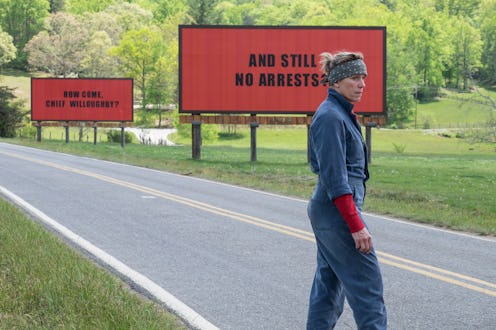Entertainment
This Chilling 'Three Billboards' Scene Shows How Easy It Is For Domestic Violence To Be Normalized

Writer and director Martin McDonagh does not shy away from harsh depictions of violence in his many films, like Seven Psychopaths and In Bruges, and his latest movie, Three Billboards Outside Ebbing, Missouri, doesn't disappoint in that aspect. Like his other works, Three Billboards, starring Frances McDormand as a mother seeking justice for her murdered daughter, has a number of violent scenes that are disturbing to watch. But while McDonagh's depictions of fights are often over-the-top, one scene in his newest movie is more troubling than most, because of how realistically, and painfully, it portrays the normalization of domestic violence.
In Three Billboards, out now, McDormand's Mildred is a middle-American woman grieving for her daughter, was raped and murdered several months prior. As a response to her local police department's inability to catch the teen's killer, Mildred rents the three abandoned billboards right outside of town to send the chief officer a powerful message. "Raped while dying," the first one reads. "And still no arrests," the next says, before the third finally asks, "How come, Chief Willoughby?" Her actions instigate a town-wide conflict, putting residents of the small community on either side of the battle, as some support Mildred's battle, while others feel she's being unfair to the Chief. Eventually, things escalate into an avalanche of revenge upon revenge, until buildings have exploded and even more are dead.
But the most troubling violent scene in Three Billboards, which occurs in the middle of the film, doesn't contain a single drop of blood. After Mildred has set up her billboards and has earned the ire of many in the tight-knit town, she's seen sitting at her dinging room table, eating breakfast with her teenage son Robbie, (Lucas Hedges). They're surprised by her ex-husband Charlie (John Hawkes), who pulls up in the driveway. He barges in, and makes clear to Mildred that, being a retired police officer, he doesn't appreciate her singling out and attacking the local department like she's done with her billboards.
They argue for a bit, and then suddenly Charlie flips the table, grabs Mildred by the neck, and pins her against the wall. In defense of his mother, Robbie grabs a kitchen knife and holds it against his father's throat. Now, earlier in the film, it's suggested that Charlie was abusive towards Mildred, though she never gets into details, so this scene offers some context to what she's likely experienced over the years. But it's what happens immediately following that is even more disturbing than the attack itself.
Once Charlie realizes that Robbie has the advantage, he lets go of Mildred. And then, as if nothing has happened, the three of them pick up the table, wipe up the spilled cereal, and go on talking about the billboards. There's no discussion of the fact that Charlie just attacked his ex-wife, or that a son had to use a large knife as a weapon to defend his mother against her abusive ex-husband. They all just sit back down, and start talking with ease as if there was never an interruption. This behavior — both the violence and the decision to pretend it never occurred — appears to be natural for all of the characters involved, which is all the more upsetting.
The scene highlights just how natural domestic violence can become for both victims and perpetrators over a number of years. Many people have notions of what domestic abuse looks like that aren't always true; some of the most pervasive myths of abusive relationships are that they are void of all care, that the abusers can't also be loving, or that they are unbearable at all times. The idea that an abuser is constantly abusive is typically a false one, but sometimes, repeated abusive behavior becomes normalized into a family's life to the point where even the victims start to treat it like no big deal, because they've come to expect it.
It's clear from this disturbing Three Billboards scene that both Robbie and Mildred had gotten used to how Charlie behaves. Mildred may have eventually divorced her abuser, but the mistreatment had gone on for so many years that it became commonplace, and she doesn't view it as abnormal. Yet the nonchalant reaction the trio have to Charlie's actions, and their return to normal conversation just moments after, is incredibly sad. And worst of all, it's an accurate depiction of how domestic violence can sometimes work for so many people.
Three Billboards might feature a lot of over the top violence that's typical for McDonagh-directed movies, but it's the simplest scene that is its most real, and the most heartbreaking to watch.